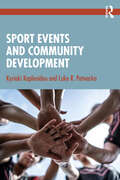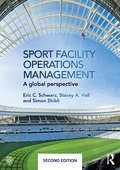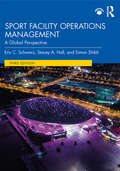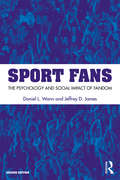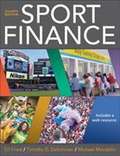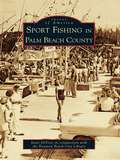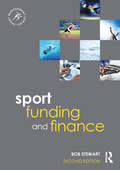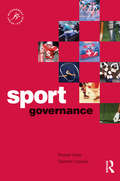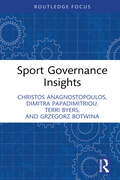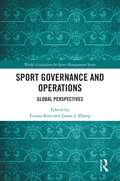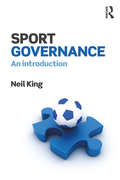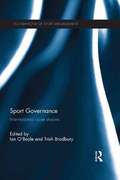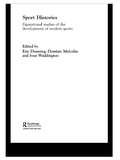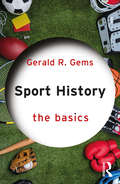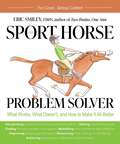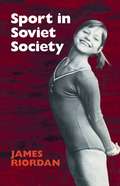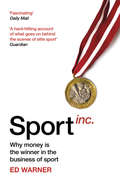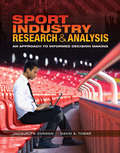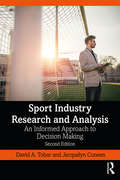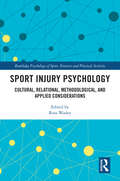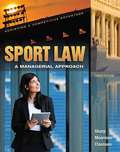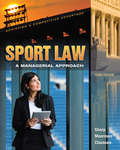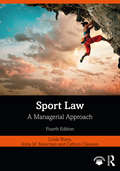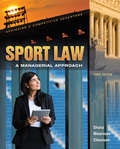- Table View
- List View
Sport Events and Community Development
by Kyriaki Kaplanidou Luke R. PotwarkaThis book examines the relationships between sport event hosting and community development goals. With sport events proliferating around the world, from major events to local events, the book explains how community goals can be embedded into sports event planning, and how events at all levels can be most effectively leveraged to achieve positive outcomes and legacies for local communities.Featuring real-world case studies and the perspective of industry practitioners in every chapter, the book explores the commercial, social, and political contexts in which events take place and what is meant by "legacy" and "impact." It introduces the key stakeholders, from residents and local government to NGOs, as well as the spectrum of goals that might be in play, and looks at partnerships working for the best effect. The book also explains the sports event management process, from bidding to planning to venue management to monitoring and evaluation, and considers how community development goals can, and should, be incorporated at every stage.With a practical focus, and full of useful features for learning and understanding, this is essential reading for any student or practitioner with an interest in sports events, community sport, sport development, event management, or sustainable business.
Sport Facility Management: Organizing Events and Mitigating Risks
by Mark S. Nagel Richard M. Southall Robin E. AmmonSport Facility Management: Organizing Events and Mitigating Risks, 4th Edition, examines what it takes to successfully operate and manage a sport facility. Veteran authors Robin Ammon, Richard Southall, and Mark Nagel provide a framework for the successful operation of sport and event venues through proven strategies and techniques, as highlighted through salient industry examples. Chapters in this edition explore the complex rules and relationships of public and private financing and ownership, the management of facility revenues and expenses, pricing strategies at the box office, approaches to booking and scheduling, best practices in leveraging human resources, as well as an understanding of and adherence to laws and regulations governing and affecting facilities, employees, and the public through venue contracts, risks, liability, negligence, crowd and alcohol management, as well as emergency planning.
Sport Facility Operations Management: A Global Perspective
by Eric C. Schwarz Stacey A. Hall Simon ShibliAnybody working in sport management will be involved in the operation of a sports facility at some point in their career. It is a core professional competency at the heart of successful sport business.?Sport Facility Operations Management?is a comprehensive and engaging textbook which introduces cutting-edge concepts in facilities and operations management, including practical guidance from professional facility managers. Now in a fully revised and updated second edition—which introduces new chapters on capital investment and operational decision-making—the book covers all fundamental aspects of sport facility operations management from a global perspective, including: ownership structures and financing options planning, design, and construction processes organizational and human resource management financial and operations management legal concerns marketing management and event planning risk assessment and security planning benchmarking and performance management Each chapter contains newly updated real-world case studies and discussion questions, innovative 'Technology Now!' features and step-by-step guidance through every element of successful sport facilities and operations management, while an expanded companion website offers lecture slides, a sample course syllabus, a bank of multiple-choice and essay questions, glossary flashcards links to further reading, and appendices with relevant supplemental documentation. With a clear structure running from planning through to the application of core management disciplines,?Sport Facility Operations Management?is essential reading for any sport management course.
Sport Facility Operations Management: A Global Perspective
by Eric C. Schwarz Stacey A. Hall Simon ShibliNow in a fully revised and updated third edition, Sport Facility Operations Management goes beyond the basic theories of sport facility management to include relevant practical professional experiences connecting facilities, people, and technology. This is a comprehensive and engaging textbook introducing cutting-edge concepts and best practice in sport facility operations management. Each chapter contains real-world case studies and discussion questions, innovative 'Technology Now' and new ‘Facility Focus’ features, and ‘In the Field’ segments about what is going on in the industry. This new edition also provides new content in the areas of project management, social and digital media, revenue generation and diversification, performance analytics, and impacts and legacies. This is a vital resource for sport management educators and students, especially those studying facility management. It is also an interesting read for industry professionals working in sport facility management, from grassroots and community complexes to global mega stadiums and arenas. Dedicated online materials include PowerPoint presentations for each chapter; multiple choice and essay questions; online appendices with diagrams, schematics, manuals, and forms; a glossary; and a sample master syllabus.
Sport Fans: The Psychology and Social Impact of Fandom
by Daniel L. Wann Jeffrey D. James<p>Sports, and the fans that follow them, are everywhere. Sport Fans: The Psychology and Social Impact of Fandom examines the affective, behavioral, and cognitive reactions of fans to better comprehend how sport impacts individual fans and society as a whole. Using up-to-date research and theory from multiple disciplines including psychology, sociology, marketing, history, and religious studies, this textbook provides a deeper understanding of topics such as: <p> <li>the pervasiveness of sport fandom in society <li>common demographic and personality characteristics of fans <li>how fandom can provide a sense of belonging, of uniqueness, and of meaning in life <li>the process of becoming a sport fan <li>sport fan consumption <li>and the future of sport and the fan experience.</li> <p> <p>The text also provides a detailed investigation of the darker side of sport fandom, including fan aggression, as well as a critical look at the positive value of fandom for individuals and society. <p>Sport Fans expertly combines a rigorous level of empirical research and theory in an engaging, accessible format, making this text the essential resource on sport fan behavior.</p>
Sport Finance
by Michael Mondello Gil Fried Timothy DeSchriverSport Finance, Fourth Edition With Web Resource, grounds students in the real world of financial management in sport, showing them how to apply financial concepts and appreciate the importance of finance in establishing sound sport management practices. Utilizing a modern and practical approach, the text encourages students to take a strategic organizational perspective in learning financial skills while gaining a deeper understanding of the reasoning behind the principles of sport finance. The fourth edition of Sport Finance has been revised and restructured to reflect the evolving needs of students entering the dynamic sport industry. Content updates and additions include the following: A new chapter dedicated to assets (such as players, facilities, and goodwill) and liabilities (such as player salaries and long-term debt) and how they affect a sport organization Expanded coverage of strategies to increase revenue and reduce expenses for greater profitability, enhanced with an example from a real-world athletic department New chapters about reviewing financial statements, planning, and building a financial strategy to help guide decisions to create, expand, or exit a sport business or organization Five new case studies covering a variety of sectors, sports, and countries to give students the opportunity to apply the concepts to practical scenarios To further relate the content to real situations for students, study questions about each of the case studies have been incorporated into a new student web resource. The web resource also includes an interactive simulation called “The Two Dollar Team” that directly engages students with the book’s topics, including assets and liabilities, revenue and expenses, budgeting, cash management, and borrowing. Instructors will also find additional activities and a case study in the companion instructor guide, and they will receive a test package and presentation package. Sport Finance, Fourth Edition, will enable students to grasp fundamental concepts in sport finance. By analyzing business structures, financial statements, and funding options, students will not only learn basic finance but will also understand how those skills are used to build a strategy and make sound financial decisions in the world of sport.
Sport Fishing in Palm Beach County (Images of America)
by Boynton Beach City Library Janet DevriesSettled along 47 miles of beautiful Atlantic coastline, Palm Beach County has long been a mecca for sport fishing enthusiasts. Graced with a mild climate and bounded with waters nourished by the warm Gulf Stream current, Palm Beach's coastal waters host a rich reserve of marine life. Featured in this captivating retrospective is a history of the sport fishing industry and tales of legendary captains, devoted weekend anglers, and wealthy sportsmen. Bringing to life the sailfish tournaments, fish fries, beauty pageants, and parades of a bygone era, this work is a tribute to the hardworking men and women who built this seaside settlement into a haven for sport fishermen. Follow the evolution of fine fishing boats and learn about the advancements in marine conservation while enjoying the natural beauty of this tropical oasis. Showcased within the book are over 200 vintage images collected from the local library's historical archive, as well as rare photographs from over 30 local sources, including the West Palm Beach Fishing Club.
Sport Funding and Finance: Second edition (Sport Management Series)
by Bob StewartSport Funding and Finance provides a complete introduction to the macro-level and micro-level aspects of sport finance. It describes the evolution of sport from a kitchen-table operation into the sophisticated, boardroom-driven global financial industry that it is today. It uses the professional sports leagues of the US and Europe as an international benchmark, and explains why the financial context is so important for all managers working in sport. The book also provides a step-by-step introduction to the principles and practice of effective financial management, providing the reader with a complete set of professional tools and skills for use in the sport industry. Now in a fully revised and updated new edition, the book develops the reader’s understanding by first explaining basic concepts in finance and accounting before progressing to more complex issues and ideas. It covers every key topic in financial management, including: Planning and strategy Budgeting Financial projections Fundraising Pricing Costing Feasibility studies Economic impact analysis Ratio analysis Every chapter includes a blend of theory, contextual material and real-world data and case studies from around the world, clearly linking principles to practice, as well as review questions and problem-solving exercises to test the reader’s understanding. Sport Funding and Finance is the perfect foundation text for any degree-level course in sport finance, and an invaluable reference for any sport management professional looking to deepen their understanding of funding and finance.
Sport Governance (Sport Management Ser.)
by Russell Hoye Graham CuskellySport Governance provides a comprehensive guide to the practical application of governance principles to amateur and professional sport organisations operating at the community, state/provincial, national, and international levels. It presents a balanced view between accepted practice and what contemporary research evidence tells us about a range of governance principles and practices. Organised in three parts, the text provides the reader with* an explanation of the concept of governance, key terms and definitions as well as the economic, political and social factors that impact on how the governance function is enacted within sport organisations;* an understanding of the “mechanics” of governance – the elements of structure, process and performance that ensure the governance function is carried out within sport organisations; and* a discussion of a number of contextual issues in sport governance, including dual leadership, ethics, governance change and future governance challenges.Sport Governance is essential reading for practitioners working and volunteering in the sport industry and upper level undergraduate and postgraduate students enrolled in sport and leisure management programs.
Sport Governance Insights (Sport Business Insights)
by Terri Byers Christos Anagnostopoulos Dimitra Papadimitriou Grzegorz BotwinaThis book introduces the fundamentals of sport governance, assuming no prior knowledge on the part of the reader. It explains to students and practitioners alike why governance matters and how it can be better practiced in sport organizations. Introducing key concepts and the micro-processes of implementation, the book explains what governance is and why it has become increasingly important. It explains what sport boards do, and how they should function for sport organizations to be effective, and it provides practical tools to help ensure good governance. Full of insights from cutting-edge research and real-world cases, this is essential reading for any student or practicing sport manager, administrator, or policy-maker who needs a concise introduction to this important topic.
Sport Governance and Operations: Global Perspectives (World Association for Sport Management Series)
by James J. Zhang Euisoo KimGovernance is at the centre of the work of all sport organizations, from small sport clubs to international sport federations. This book explores sport governance in today’s globalised marketplace. It adopts a broad, modern definition of ‘governance’ that includes the operational process of organizing resources and the implementation of standing policies and plans, as well as regulation, direction, control and evaluation. The book presents a series of cutting-edge case studies that shine important new light on key themes in contemporary sport management, including sustainability, human resource management, cross-cultural management and labour markets, across a wide range of sporting contexts, from Formula One and the Commonwealth Games to the NCAA. Bringing together researchers and practitioners from five continents, it represents an important platform for the international exchange of ideas, best practices, and scholarly enquiry. This is fascinating reading for any student, researcher or practitioner with an interest in sport business and management, event management or international business.
Sport Governance: An introduction
by Neil KingSport governance has become an increasingly widespread subject for research and teaching in sports studies. This engaging and accessible textbook examines the governance of sport organisations in a changing political, legal, financial and socio-cultural context. It explains how sport organisations are governed, explores the issues and challenges faced by those governing sport today, and looks ahead to how sport can be governed better in the future. Covering sport at all levels, from community organisations and national governing bodies to international organisations such as the IOC and FIFA, this text examines key components of governance, such as legal and regulatory frameworks, stakeholding, performance, compliance and the reform of the non-profit sector in line with corporate governance. This text is also timely given that recent corruption scandals in sport have served to highlight the central importance of good governance in sport. Its nine chapters draw upon more than thirty international case examples across a range of sports including athletics, football, gymnastics, hockey, rowing, rugby, badminton and tennis. With extensive lists of learning activities and resources, original empirical research and insights into the politics of policymaking and implementation, this textbook is essential reading for any course on sport governance, policy, management or development.
Sport Governance: International Case Studies (Foundations of Sport Management)
by Ian O'Boyle Trish BradburyGovernance has become a hugely important issue within sport. Issues of corruption and ‘bad governance’ have become synonymous with some aspects of sport and closer scrutiny than ever before is being applied to ensure organisations are following international best practice in respect to how they are governed. As sport organisations are required to become more professional and to adopt a more transparent and accountable approach to their operations, it has become important for all students, researchers and professionals working in sport to understand what good governance is and how it should be achieved. This book is the first to examine sport governance around the world. It offers a series of in-depth case studies of governance policy and practice in 15 countries and regions, including the US, UK, China, Australia, Canada, South Africa, Latin America and the Middle East, as well as chapters covering governance by, and of, global sport organisations and international sport federations. With an introduction outlining the key contemporary themes in the study of sport governance, and a conclusion pointing at future directions for research and practice, this book is essential reading for any course on sport management, sport policy, sport development, sport administration or sport organisations, and for any manager or policy-maker working in sport and looking to improve their professional practice.
Sport Histories: Figurational Studies in the Development of Modern Sports
by Dominic Malcolm Eric Dunning Ivan WaddingtonSports Histories draws on figurational sociology to provide a fresh approach to analysing the development of modern sport. The book brings together ten case studies from a wide range of sports, including mainstream sports such as soccer, rugby, baseball, boxing and cricket, to other sports that until now have been largely neglected by sports historians, such as shooting, motor racing, tennis, gymnastics and martial arts. This groundbreaking work highlights key debates in the analysis of modern sport, such as: the relative influence of intra-national class conflict and international conflict the relative prominence of commercially led processes in different contexts the centrality of concerns over violence differences between elite and mass-led sports developments. Above all, Sport Histories proves the distinctiveness of the figurational sociological approach and its usefulness in the study of the development of modern sport.
Sport History: The Basics (The Basics #8)
by Gerald R. GemsThis is a fundamental text for the study of sport history. It answers the ‘why,’ ‘how,’ and ‘what’ questions, introducing the key principles and practices of sport history and walking the reader through the fascinating stories, debates, issues, and national and international narratives that constitute the history of sport. The book provides an overview of the field and the various professional roles assumed by practitioners, such as researchers, academics, and public historians. It is brief, crisp, and to the point. The main general topics of interest within the field – gender, race, nationalism, religion, sport and leisure, and megaevents – are covered with introductory vignettes, stories of interest, a wide variety of theoretical frameworks, and relevant historiography in the most current and timely text of its kind. Each chapter provides a list of further readings for more in-depth study. Students are taught how to conduct research and present their findings in a variety of mediums, and teaching and publication tips are offered for educators. Sport History: The Basics is essential reading for any student on a sport-related degree course or with an interest in social and cultural history. It is also fascinating reading for anybody with a general interest in sport.
Sport Horse Problem Solver
by Eric SmileyA simple system for figuring out and fixing what’s wrong with a horse’s performance. Former international event rider Eric Smiley has brought along his own top-level horses for decades. Now he taps his immense knowledge to help riders whose horses may not have had "the right start." Every horse comes with his own “baggage”—behavior or training issues, minor or significant, that may be difficult to pinpoint or resolve. In these pages, Smiley addresses the most common problems he has seen over the years in dressage, eventing, and show jumping, including: Problems with head and neck position. Connection issues. Failure to follow the rules of forward, straight, and regular. Difficulty with collection. Lack of consistency. Smiley teaches readers how to identify what isn’t working by looking at how things should work. Then he walks us through dismantling and reassembling the issues, providing an easy-to-follow system for determining what's potentially wrong with a horse and choosing sensible exercises for fixing it. He introduces a troubleshooting five-point system: Ask yourself, “What is the problem?” Ask, “How, when, and why did it arise?” Ask, “Why does it need solving?” Formulate a plan. Analyze the results in the context of “now” and what they may mean for the future. Layers and shifts of understanding in horses combined with the physical and psychological challenges of riding can often make solving problems that arise seem complicated, and sometimes it is difficult to know where to even begin. Smiley’s system helps readers find that “start point” and map out a sensible plan for future training. He shows how to determine when something may have become an issue for your horse or your performance, ways to try and avoid it happening in the first place, and of course, offers highly practical solutions to employ when you find you do have a problem. Smiley’s goal is to “always leave people and horses with a positive journey to go on, with the prospect of ‘better to come.’” With its usefulness, cross-disciplinary approach, and optimism, The Sport Horse Problem Solver is all you need to achieve success in partnership with your horse, wherever you are in your journey together.
Sport In Soviet Society: Development of Sport and Physical Education in Russia and the Ussr (Soviet and East European Studies #22)
by James RiordanThe basic material for this book was gathered in different parts of the Soviet Union from i960 to 1975, eventually materialising as a PhD thesis for the University of Birmingham. My thanks are due particularly to my former colleagues and team mates at Progress Publishers, Moscow, Yuri Sdobnikov and Len Stoklitsky, for firing my enthusiasm yet harnessing my energy; they are, of course, not a whit responsible for any of the views I express.
Sport Inc.: Why money is the winner in the business of sport
by Ed WarnerWhy would someone pull the plug on a Premier League match? What prompts an athlete to search for sponsorship on eBay?How can the decision of a drinks brand CEO make or break an entire sport?Why would a sprinter think they can’t afford not to dope?Sport Inc. reveals the behind-the-scenes finances that drive sport - who gets rich and who gets left on the bench.Through investigations into a wide range of sports, including how football agents really work, the betting industry and corruption, esports, the NFL’s efforts to take over the world and the real cost of hosting events like the World Cup and the Olympics, the financial realities of our obsession with sport are exposed.As spectators our choices make us key players in this game of riches – it’s time to find out who’s winning and who’s losing.
Sport Industry Research and Analysis: An Approach to Informed Decision Making
by Jacquelyn Cuneen David TobarSport Industry Research & Analysis offers a no-nonsense, straightforward approach to the study of research design and statistical analysis in the sport enterprise. Each chapter outlines real-world instances in which research and statistics contribute to bottom-line decisions. The book includes clear, progressive instructions, using spreadsheets for statistical computations and analyses. The explanations for the calculations and analyses are presented in the context of sport industry scenarios with sample data. Additional scenarios with sample data provide hands-on practice with each statistical test. "In Practice" contributions from sport industry professionals demonstrate how these practitioners use research and statistical analysis in their everyday tasks. This book's succinct, applied approach to research design and statistical analyses provides readers with essential skills to help them understand the importance of an information-based approach to decision making in the sport enterprise.
Sport Industry Research and Analysis: An Informed Approach to Decision Making
by Jacquelyn Cuneen David A. TobarSport Industry Research and Analysis offers a straightforward, no nonsense approach to research design and statistical analyses in sport organizations. This fully revised and updated new edition describes the research process, from identifying a research question to analyzing data, and uses real world scenarios to help students and industry professionals understand how to conduct research and apply the results in their wider work. The book includes clear, step-by-step instructions for the analysis and interpretation of data. It explains how to use Excel and SPSS for every key statistic and statistical technique, with screenshots illustrating every step and additional scenarios providing further context. "In Practice" contributions from sport industry professionals demonstrate how these practitioners use statistical analyses in their everyday tasks, and this new edition includes expanded sections on conducting a literature review and research ethics, as well as ancillary materials for instructors including slides, test questions, data files, answer sheets, and videos. This is the clearest and most easy-to-use guide to research and analysis techniques in sport, helping the reader to build essential skills and confidence in using statistics, vital to support decision-making in any sport enterprise. It is an essential text for any sport business research methods course, and an invaluable reference for all sport industry professionals.
Sport Injury Psychology: Cultural, Relational, Methodological, and Applied Considerations (Routledge Psychology of Sport, Exercise and Physical Activity)
by Ross WadeyWritten by a team of international experts and emerging talents from around the world, Sport Injury Psychology: Cultural, Relational, Methodological, and Applied Considerations challenges the status quo of the field of sport injury psychology and opens new and exciting future research trajectories by critically considering: How to evolve from an individual focused and single, scientific discipline into a cultural and relational focused and interdisciplinary discourse How to shift from the dominant positivist foundation towards a more inclusive scholarship with divergent epistemologies, theories, and methodologies How to replace the attempt to establish ‘best practice’ and desire for ‘clean’ findings with the need for continuous innovation and multifaceted applied experiences Each chapter stimulates debate and encourages theoretical, methodological, and/or applied diversification, and closes with future research directions that provide novel and rigorous programs of research that have the potential to advance the field of sport injury psychology into an interdisciplinary discourse that strives for and embraces collaboration between academic disciplines and with practitioners working in the field. Cutting edge, timely, and comprehensive, Sport Injury Psychology: Cultural, Relational, Methodological, and Applied Considerations is essential reading for undergraduate students, postgraduate students, and more established scholars in the fields of sport communication, sports medicine, sport psychology, sports sociology, and other related sport science disciplines.
Sport Law: A Managerial Approach
by Linda A. Sharp Anita M. Moorman Cathryn L. ClaussenSport Law: A Managerial Approach, third edition, merges law and sport management in a way that is accessible and straightforward. Its organization continues to revolve around management functions rather than legal theory. Concise explanations, coupled with relevant industry examples and cases, give readers just enough legal doctrine to understand the important concepts that apply to each area. This book will help prepare students as they get ready to assume a broad range of responsibilities in sport, education, or recreation.
Sport Law: A Managerial Approach
by Linda A. Sharp Anita M. Moorman Cathryn L. ClaussenSport Law: A Managerial Approach, third edition, merges law and sport management in a way that is accessible and straightforward. Its organization continues to revolve around management functions rather than legal theory. Concise explanations, coupled with relevant industry examples and cases, give readers just enough legal doctrine to understand the important concepts that apply to each area. This book will help prepare students as they get ready to assume a broad range of responsibilities in sport, education, or recreation. Whether readers work as coaches or teachers; administer professional programs; manage fitness/health clubs; or assume roles in a high school, college, Olympic, or professional sport organization, legal concerns will inevitably be woven into their managerial concerns. This book provides knowledge of the law that helps create a competitive advantage and build a more efficient and successful operation that better serves the needs of its constituents.Special Features of the Book Managerial context tables. Chapter-opening exhibits act as organizational and study tools identifying managerial contexts in relation to major legal issues, relevant law, and illustrative cases for the chapter. Case opinions, focus cases, and hypothetical cases. Legal opinions--both excerpted (case opinions) and summarized (focus cases)--illustrate relevant legal points and help readers understand the interplay between fact and legal theory. The cases include questions for discussion, and the instructor’s manual provides guidance for the discussion. Hypothetical cases further highlight topics of interest and include discussion questions to facilitate understanding of the material; analysis and possible responses appear at the end of the chapter. Competitive advantage strategies. Highlighted, focused strategies based on discussions in the text help readers understand how to use the law to make sound operational decisions and will assist them in working effectively with legal counsel. Discussion questions, learning activities, and case studies. Thoughtful and thought-provoking questions and activities emphasize important concepts;they help instructors teach and readers review the material. Creative case studies stimulate readers, as future sport or recreation managers, to analyze situations involving a legal issue presented in the chapter. Annotated websites. Each chapter includes a collection of web resources to help readers explore topics further. Accompanying the web addresses are brief descriptions pointing out key links and the sites' benefits. Bookmarking these sites will help readers in future research or throughout their careers.
Sport Law: A Managerial Approach
by Anita M. Moorman Cathryn Claussen Linda SharpNow in its fourth edition, this text is still the only sport law textbook to introduce sport legal studies from a management perspective and integrate legal strategies to gain a competitive advantage in business. Acknowledging that students understand legal concepts better when they are tied to real sport management practice, the book is organized around the core management functions. It provides concise explanations of key concepts, as well as current industry examples and legal cases, and gives the student all the legal knowledge they need to become confident and effective professionals in sport management, recreation, or sport education. This new edition includes additional contributions from leading sport law educators and practitioners, and has expanded coverage of important contemporary issues including: · Sports injury and concussion litigation· Impact of Covid-19 on events and leagues· Gender discrimination, disability discrimination, sexual harassment, #metoo, and USWNT pay equity· Intellectual property, licensing agreements, publicity rights, social media influencers, and digital privacy· Student-athletes and marketing rights· Sport gambling and state regulation· Athlete activism, employee free speech, and collective bargaining· Olympic and Paralympic restructuring· NCAA Division 1 Coaches Contracts The book contains useful features and ancillaries to help with teaching and learning, including managerial context tables, case opinions, focus cases, strategies for competitive advantage, discussion questions, and learning activities. It is an essential text for any course on sport law or recreation law, an invaluable supplement to any course on sport business and management, and an important reference for all sport management practitioners. Online resources include a variety of exam questions for each chapter, featuring multiple choice, true or false, short answer exam questions and short essay questions, and a sample syllabus.
Sport Law: A Managerial Approach
by Anita Moorman Cathryn Claussen Linda SharpSport Law: A Managerial Approach, third edition, merges law and sport management in a way that is accessible and straightforward. Its organization continues to revolve around management functions rather than legal theory. Concise explanations, coupled with relevant industry examples and cases, give readers just enough legal doctrine to understand the important concepts that apply to each area. This book will help prepare students as they get ready to assume a broad range of responsibilities in sport, education, or recreation. Whether readers work as coaches or teachers; administer professional programs; manage fitness/health clubs; or assume roles in a high school, college, Olympic, or professional sport organization, legal concerns will inevitably be woven into their managerial concerns. This book provides knowledge of the law that helps create a competitive advantage and build a more efficient and successful operation that better serves the needs of its constituents. New to the Third Edition New/expanded discussions and analysis of current and relevant legal issues. For example, the use of unpaid interns and unpaid volunteers; Bountygate, organizational liability for violent acts of players, and the power of the NFL commissioner; parody and social media; FTC guidelines for endorsers New case opinions. For example, Bouchat v. Baltimore Ravens; Glatt v. Fox Searchlight Pictures New focus cases. For example, Hart v. Electronic Arts, Inc., Hamill v. Cheley Colorado Camps, Inc., Geczi v. Lifetime Fitness, Limones v. School Dist. of Lee County; Woodman v. Kera LLC New competitive advantage strategies. For example, construction safety; ticket sales; worker’s compensation and student-athletes Discussion of the legal issues revolving around social media use. For example, Mendenhall v. Hanesbrands and the use of Twitter by professional athletes; IOC guidelines regarding the use of social media by athletes and journalists; social media policies at the high school and collegiate levels Real-world applications. The book is intended for future sport managers, and topics are clearly related to specific roles and functions; relevant and timely examples throughout help generate enthusiasm and lively class discussions. Continued focus on both sport participation and recreation. Sport managers in a variety of organizations can use the legal issues discussed throughout. Reader-friendly tone. Legal theories are clearly explained in student-friendly language. Special Features of the Book Managerial context tables. Chapter-opening exhibits act as organizational and study tools identifying managerial contexts in relation to major legal issues, relevant law, and illustrative cases for the chapter. Case opinions, focus cases, and hypothetical cases. Legal opinions--both excerpted (case opinions) and summarized (focus cases)--illustrate relevant legal points and help readers understand the interplay between fact and legal theory. The cases include questions for discussion, and the instructor’s manual provides guidance for the discussion. Hypothetical cases further highlight topics of interest and include discussion questions to facilitate understanding of the material; analysis and possible responses appear at the end of the chapter. Competitive advantage strategies. Highlighted, focused strategies based on discussions in the text help readers understand how to use the law to make sound operational decisions and will assist them in working effectively with legal counsel. Discussion questions, learning activities, and case studies. Thoughtful and thought-provoking questions and activities emphasize important concepts;they help instructors teach and readers review the material. Creative case studies stimulate readers, as future sport or recreation managers, to analyze situations involving a legal issue presented in the chapter. Annotated websites. Each chapter includes a collection of web resources to help readers explore topics further. Accompanying the web addresses are brief descriptions pointing out key links and the sites'...
